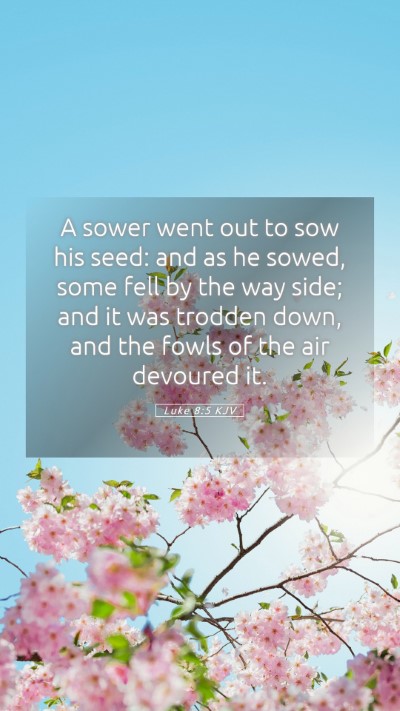Bible Verse Interpretation of Luke 8:5
Luke 8:5 states: "A sower went out to sow his seed; and as he sowed, some fell by the wayside, and it was trodden down, and the fowls of the air devoured it." This verse is part of the Parable of the Sower, a teaching of Jesus that has rich implications for understanding spiritual receptiveness and the varied responses to God’s word.
Summary of Commentary Insights
-
Matthew Henry: Henry emphasizes the importance of the sower's intention and the various conditions under which the seeds (representing the word of God) fall. He illustrates that the sower represents Christ who is proactive in spreading the Gospel, and notes that not all who hear will respond positively. The wayside symbolizes hardened hearts where the truth cannot take root.
-
Albert Barnes: Barnes expands upon the metaphor of the seed, suggesting that the act of sowing reflects the different receptions of the Gospel across diverse audiences. He explains that the "wayside" represents those who are indifferent or reject the message outright, making them susceptible to the influence of evil.
-
Adam Clarke: Clarke provides a historical context surrounding agricultural practices of the time. He highlights how some seeds would inevitably fall on unfavourable ground due to the sower's method, symbolizing the careless or superficial acceptance of spiritual truth found in the hearts of some individuals.
Meaning and Implications
The verse serves as an illustration of how the Gospel is disseminated and emphasizes the need for a proper environment for spiritual growth. The “wayside” metaphorically speaks to those who, perhaps due to distractions, apathy, or external pressures, are unable to nurture the seeds of faith. This teaches believers about the significance of providing fertile ground for the truths of God’s word within their communities.
Scripture Analysis
When analyzing Luke 8:5 in the context of the surrounding verses (Luke 8:4-15), we get a more in-depth understanding of the parable. The explanations Jesus later provides (notably in verses 11-15) clarify the meaning of the seeds and soils, with each type of ground representing different hearts and their response to God's message.
Practical Applications
This parable encourages believers to reflect upon their own spiritual receptivity and to consider the environments in which they share their faith. It implies that the responsibility of spreading the word lies with the Christians, while the reception of that word varies greatly among individuals.
Additional Bible Cross References
- Matthew 13:3-8 - A similar account of the Sower's Parable.
- Mark 4:3-9 - The Gospel according to Mark also discusses the Sower.
- John 10:10 - Reference to the purpose of Christ coming to give life abundantly, resembling the fruitful seed.
- 1 Corinthians 3:6-9 - The importance of laboring in God's field, indicating that growth depends on God.
- Isaiah 55:10-11 - God’s word not returning void signifies the inevitable success of His message.
Conclusion
In conclusion, Luke 8:5 offers profound insights into the complexities of personal faith and communal sharing of the Gospel. Through studying this verse, believers can gain greater understanding of their own spiritual journeys and the importance of fostering an environment conducive to faith. This is crucial for those engaging in Bible study groups or utilizing Bible study tools for deeper Bible verse understanding.
Engaging with these Bible verse interpretations in online resources can greatly enrich one’s personal Bible study lessons and provide better clarity in understanding Scripture.


